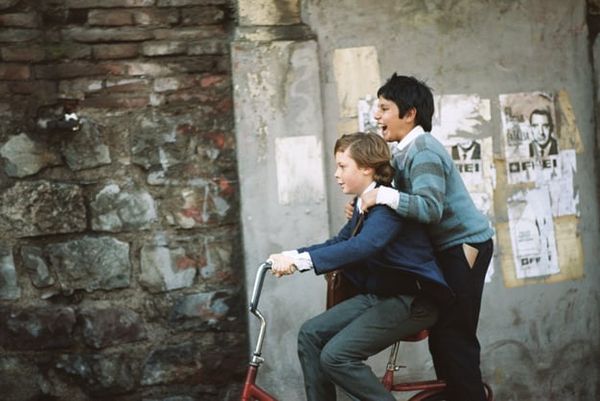Eye For Film >> Movies >> Machuca (2004) Film Review
Machuca
Reviewed by: Nick Jones

Based in Santiago, Chile, during the turbulent year of 1973, Andres Wood's latest film details the childhood of Gonzalo (Mathias Quer) and the friendship he forms with Pedro Machuca (Ariel Mateluna), a new boy at school. Pedro is one of several impoverished children, who are introduced to the school by free-spirited priest Father McEnroe. Both the rich pupils and their parents resent this class integration and before long the external political climate forces its way into the school and the friendship is tested to its limits.
The film could easily have been heavy-handed and one-sided in its portrayals of the feuding classes. Instead, the hatred and the troubles are shown to be on both sides, making the story's violent outcome inevitable and tragic. Whilst Pedro embraces his new upper-class friend without prejudice, his cousin Silvana repeatedly teases Gonzalo and calls him a snob, oblivious to the reality of his background. Despite their financial security, his family is rotten at the roots - his father is wrapped in work, his mother is having an affair and his sister is dating a member of the National Front.

The performances are faultless. Ernesto Malbran is suitably charismatic as Father McEnroe who, behind the closed doors of the school and away from the ongoing political war outside, battles each day to teach the kids to respect each other. Mateluna is perfectly cast as Pedro, his angelic features and small frame making his defiant actions all the more powerful and rendering Gonzalo's attraction to him wholly credible. Manuela Martelli is emphatic, as the fiery Silvana, and Aline Kuppenheim, playing Gonzalo's cheating mother, is convincing in the rich bitch role, although we never find out quite why she is sleeping with such an ugly old man.
Quer is brilliant as Gonzalo, his low-key performance, through blank stares, conveying his indifference to the politics around him. In the film, his bike is used as a symbol of the class difference between him and his friend, a difference which constantly threatens to tear them apart. There are two pivotal scenes where Gonzalo is riding his bike and the camera focuses on his face. The first is as he rides home after his first sweet taste (literally) of love and the second as he rides for his life, away from the soldiers who have brutalised Pedro's household. Again, the bike is symbolic of his higher status, as he is able to escape the fate of his friend's family.
In the space of time between these two sequences, Gonzalo's world free falls from the heights of love and hope to utter heartbreak and despair. In both scenes, Quer's acting is unforgettable, his contrasting expressions forming perhaps the two most striking images in the film's two hours.
Wood never forces any viewpoint down your throat, preferring to present various arguments and events through graffiti, newspaper headlines and TV newsflashes. The fact that the children sell flags to the protestors of both sides is a comical, yet poignant, way of reinforcing their disassociation with the situation around them, a detachment which becomes increasingly ironic as they become embroiled, whether they like it or not, in the escalating tension.
Machuca is a beautifully crafted and moving tale about a particularly difficult and hate-filled era of Chilean history and although its message is ultimately a bleak one, there is perhaps an underlying sense of hope that survives, with certain characters retaining their dignity, to the very last, in the face of oppression.
Reviewed on: 06 May 2005



















